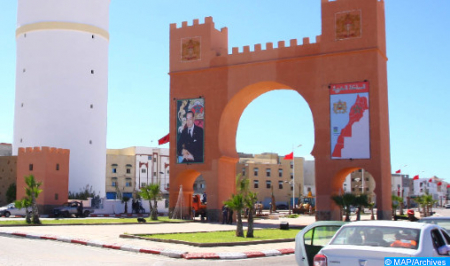Canberra: Webinar on International Dynamic of Supporting Morocco’s Territorial Integrity
The Moroccan-Australian Friendship Association (MAFA), in collaboration with the Embassy of the Kingdom of Morocco in Canberra, organized a webinar entitled “International dynamics strengthening support for the territorial integrity of Morocco”, in relation to the recent positive developments in the Moroccan Sahara issue. This webinar was attended by a large number of academics, researchers, parliamentarians and representatives of the business community. The panelists who took part in this event addressed, among other things, the recent court ruling issued by the New Zealand High Court rejecting the separatists’ allegations concerning the phosphate trade between Morocco and New Zealand, the socio-economic impact of the various structuring projects initiated in the southern provinces, as well as the growing dynamic of international recognition of the Moroccanness of the Sahara. They also discussed the dire situation facing the populations in the Tindouf camps and deconstructed unfounded allegations over the issue of natural resources and human rights. For his part, Ambassador of HM the King to Australia Karim Medrek surveyed the genesis of this artificial dispute whose origins date back to the time of the Cold War. He stressed that, for years, Morocco had participated in good faith in carrying out the Settlement Plan proposed in 1991 by the United Nations, enumerating the difficulties regarding its implementation, starting with the process of identification which was its essential element. Medrek recalled that following the report of the UN Secretary General of July 2000, the Security Council reached the conclusion to recommend that the latter should explore other means to reach a lasting and mutually acceptable solution to this dispute. The Moroccan diplomat said that it is in this spirit that the Kingdom, through its resolute and irreversible commitment to reach a political solution, had submitted in 2007, to the Secretary-General of the United Nations, the Moroccan Initiative for Autonomy which is characterized by its flexibility and realism and does respect all the parameters set by the Security Council. The Ambassador deplored the laxity of the other parties to engage, in good faith, in the UN process to reach a final solution to this regional dispute, aimed at preserving stability and peace in the North African and the Sahel region and would ensure the stability of the five Maghreb states. Medrek concluded his speech by affirming that the issue of the Sahara is a question of completion of the territorial integrity of Morocco and not of decolonization, adding that only a political solution, under the exclusive aegis of the United Nations, based on the Moroccan Autonomy Initiative could put an end to this dispute.

